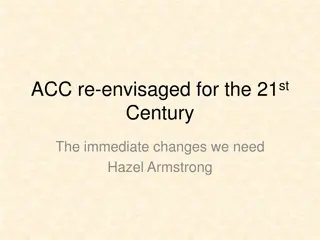Market Shaping and Neoliberalism: Britain's Present and Future
Explore how neoliberalism led the UK into an economic trap and how policymakers can shape markets to escape it. Learn about the consequences of stagnation and the failure of further financialization as a response.
Download Presentation

Please find below an Image/Link to download the presentation.
The content on the website is provided AS IS for your information and personal use only. It may not be sold, licensed, or shared on other websites without obtaining consent from the author. Download presentation by click this link. If you encounter any issues during the download, it is possible that the publisher has removed the file from their server.
E N D
Presentation Transcript
Intro and Recap: States, Market Shaping and Neoliberalism Here at the Institute for Innovation and Public Purpose, we study the relationships between the state and society, market shaping, and innovation. This lecture is the second about market shaping on a very large scale Britain, a major industrial nation, interacting with global markets The last lecture was about the past about how the United Kingdom went through a process of large scale economic innovation following the failure of the Commonwealth to be an effective political and economic bloc and about how neoliberalism shaped and ultimately undermined that process. Today s lecture is about the United Kingdom s present and future about the way neoliberalism led the UK into an economic trap. And finally the goal today is to talk about market shaping at the largest scale how policymakers might think about market shaping with the goal of escaping the neoliberal trap.
Background to Our story: Recap of Last Two Lectures on Neoliberalism Neoliberalism is a global system that emerged out of the economic and political crisis of the 1970 s, which harkened back to the classical liberal order of the 19th century. Its ideology was market fundamentalism, but its reality was a political economy of power. Neoliberalism as a global system worked to weaken states and strengthen private power. Neoliberalism in particular seeks to neutralize the state as a means for societies to shape markets. The United Kingdom beginning with Margaret Thatcher s government embraced market fundamentalism more than most societies.
The UK in the Neoliberal Age - Financialization Neoliberalism is a global system and the UK has played a particular role in that system as a global capital markets center, as a center for the management of global firms, and as an important part of European industrial and technology supply chains. During the neoliberal era, the Uk went from being the world s most industrialized advanced economy to being among the most financialized advanced economies. In a world where the idea of capital market efficiency was hegemonic, the UK choose to specialize in and to shape capital markets. That meant three things low taxes, weak financial regulation, and minimal barriers to cross border capital flows. The result was an economy uniquely vulnerable to the boom and bust cycles of unregulated capital markets.
British Industry in the Neoliberal Age After failing to overcome it s legacy of racism and convert the British Empire into a viable economic and political bloc, Britain went into Europe. Integration with Europe and the adoption of German and Japanese industrial management techniques saved British industry in the 1980 s and 1990 s. But the neoliberal form that European integration took in Britain could not retain political support. Already challenged by weakening post-2008 demand, British industry lost favored access to European markets without any major market replacement in the 2015-2020 period.
The Long-Term Post 2008 Stagnation of the British Economy Unlike every major developed world economy, Britain has stagnated since 2008 real GDP growth rate of 0.8% since 2008 half that of the United States. Stagnated in terms of GDP, and in terms of incomes. There are three levels of explanation for this stagnation: Things that other countries went through as well COVID, inflation Things that other countries went through as well but hurt Britain worse the 2008 crash and aftermath in the financial markets, austerity Things unique to Britain, or unique in their severity Brexit Neoliberal structural choices that Britain shared to a degree with other neoliberal countries weak labor markets, weak worker training systems, long term declines in public investment and state capacity.
The Consequences of Stagnation Not enough tax revenue to support the NHS, the education system, or to operate key public infrastructure. Not enough tax revenue to fund necessary investments in meeting it s net zero commitment and other climate related objectives. Not enough tax revenue to fund security related goals post-Ukraine invasion. Vulnerability of currency General social tensions and risk of out-migration both at a regional and national level. THE CONSEQUENCES OF STAGNATION THREATEN A VICIOUS CIRCLE
2022 and the Failure of Further Financialization as a Response In 2022, after Britain emerged from Brexit and COVID in significantly worse shape than other OECD member countries, Liz Truss won the leadership of the Conservative Party by promising to use neoliberal policies to restart growth. Financial markets responded very negatively to unfunded tax cuts, even when paired with financial deregulation. The resulting financial instability led to the fall of the Truss government and the repeal of her plan. In its aftermath economic stagnation continued.
Understanding the Trap Through the Lens of Labour Force Participation and the NHS (Part 1) Labour force participation, together with worker productivity, are key drivers of the overall capacity of an economy to produce goods and services. The UK s workforce participation rate remains a full percentage point lower than it was pre-pandemic. While aging demographics contribute to this trend, health scholars have identified rising rates of long-term illness and disability as important factors. These numbers cannot be separated from the long term post- 2008 crisis of the National Health Service
Understanding the Trap Through the Lens of Labour Force Participation and the NHS (Part 2) British health care spending is significantly lower per capita than that of other major European economies. But this understates the problem UK health care spending has two components NHS spending at roughly 8% of GDP, and private health spending at roughly 2.5% of GDP. Yet only 10% of the UK purchases private health care. Compare to France where 90% of population has private supplemental health insurance. Per capita expenditures under the NHS for the 90% of the population that relies upon it exclusively are dramatically under per capita spending in other major European countries.
Another Way of Looking at the Tra Education and Productivity British spending on education rose dramatically during the Blair government but has fallen equally dramatically since 2008. But again, as in health care, there is a class structure to British education spending. OECD analysis puts UK public spending on education at 3.9% of GDP in 2018. This was 19th highest out of the 37 OECD members with data on this measure and below the OECD average of 4.1%. If private expenditure on education is included then the UK s total spending on education in 2018 was 6.1% of GDP, This is particularly striking when compared with Germany, who as we saw last week was dramatically more successful than the UK in preserving its industrial base twice as many UK residents of working age have only a basic high school education as do German residents.
Understanding the Impact of Not Taxing Capital Assets and Capital Gains In 2021, according to the OECD, UK capital gains tax revenue was 1.7% of all revenue Despite having the world s second largest capital market, and by far the world s largest capital market in relation to the size of its economy this is less than half the proportionate scale of US capital gains taxes to overall revenue. If UK capital gains tax revenue was the same proportion of total revenues as US capital gains, this would have added another approximately 20 billion pounds to total UK revenues.
Understanding the UKs Role in the Global Tax System and its Implications for the UK The United Kingdom itself has one of the lowest overall tax rates in the developed world just above that of the United States (simply increasing UK tax rates to Canadian rates would result in close to 100 billion pounds in increased annual revenue). A large number of the world s major tax havens are Crown territories and linked to the UK s financial markets and accounting and legal firms including Bermuda, British Virgin Islands, the Cayman Islands, Guernsey, Jersey and the Isle of Man. The United Kingdom has worked with those countries and with Ireland to thwart efforts at the adoption of international minimum corporate tax rates most recently in the OECD BEPS process successfully insisting on lowering the minimum corporate rate to 15%, well below that of most developed countries. IMF officials estimated in 2018 that 50% of British overseas investment flows through tax havens, and British household wealth in tax havens was 15% of GDP, or approximately 330 billion pounds. It is unclear the extent to which this system as a whole is depriving the British state of resources for example it is impossible to determine the true extent of the assets of UK residents domiciled in tax havens, or the degree of interdependence between the City of London and the Crown dependencies.
How Neoliberalism Led Britain into an Economic Trap - Closing Off Sources of Growth Trade Collapse of politically unsustainable European relationship and the effect on private sector investment. Austerity and the Larger Fiscal Trap--Education, Health, Public Investment, Private Capital Investment and Labor Productivity, Worker Bargaining Power and the Absence of Wage Led Growth <a href='https://www.macrotrends.net/countries/GBR/united- kingdom/exports'>U.K. Exports 1970-2023</a>
Need for Fundamental Change The United Kingdom needs a fundamentally new economic strategy. The ways the United Kingdom achieved economic growth under the neoliberal global order are no longer available. The United Kingdom, needs to understand and act on what Harvard Business School Professor Michael Porter calls its competitive advantage as a nation. The UK has some extraordinary competitive advantages its engineering legacy, its universities, its world class capital markets, and its cultural assets the English language foremost among them.
Trading Financial Capital for Human Capital The United Kingdom s core mistake in the neoliberal era was to substitute attracting foreign capital for comprehensively developing its human capital so that it could make the most of its competitive advantages. As long as capital markets were growing, the UK was firmly within Europe and key emerging markets were on good terms with the UK, the contradiction between financial capital and human capital could be managed. But once the UK s capital markets stagnated and Britain s engagement with Europe collapsed politically, it became clear Britain s low tax strategy could not sustain or grow Britain s human capital. And after COVID and the inflation resulting from COVID and Russia s attack on Ukraine, the UK s key institutions that maintain and grow its human capital are in profound crisis.
Upgrading and Transforming Physical Infrastructure Britain s public infrastructure is straining due to lack of maintenance, obsolescence and the challenges of climate change. To meet the UK s net zero mandate and to maintain competitive internal transport and telecommunications systems will require investments in the 500-600 of billion range between now and 2035 according to the current government. This is an opportunity for the UK in terms of competitiveness, good job creation and global leadership. These are long lived physical assets that should be financeable. The economic growth consequences are easily measurable in terms of multiplier effects, but could be far greater if basic infrastructure weaknesses are addressed as we move to net zero true universal broad band access, Transpennine interconnectivity.
The Punchline: Post Neoliberal Britain is in Need of Large-Scale Innovation Innovation not in the sense of one or even a set of new technologies, but in the sense of linking new technologies to new economic and social arrangements Replacing a low tax political economy with a level of taxation that can support high productivity human capital and the infrastructure investments needed to fight climate change and support a human capital based economy. Breaking down barriers of class, race and region that limit the development of human capital starting with the provision of basic services like health care, secondary education, broadband access and transport. Rethinking the relationship to Britain s former colonies and their people seeing them not as markets or sources of temporary labour but as part of a non- hierarchical network of value creation. This must begin with a real reckoning with the past with empire and racism. Large scale innovation means an entrepreneurial state one that can work with business, trade unions and civil society to remake markets so Britain can prosper in the 21stcentury.























